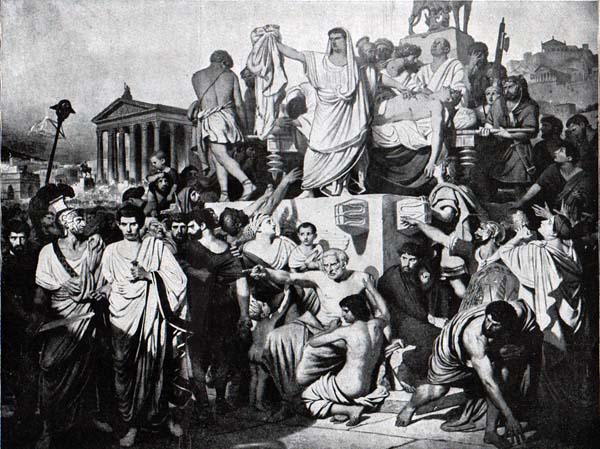
"Death of Caesar". Joseph Desire court (1798-1865)
In the year B. C. 44 an important meeting of the Roman Senate had been called for the Ides (15th) of March, on which memorable day Julius Caesar, the greatest man of the ancient world, — citizen, statesman, orator, general, man of letters, — the idol of the Roman people, entered and took his seat. His presence had an awesome effect on men, and his would-be assassins had determined to act at once, lest they should lose courage. They gathered round him ; Cimber caught his gown ; Cassius stabbed him in the throat. He leaped to his feet with a shrill cry. Another poniard entered his breast. " He looked around, and seeing not one friendly face, but only a ring of daggers pointed at him, he drew his gown over his head, gathered the folds about him, and sank down without uttering another word."
The body was brought down to the Forum and placed upon the Rostra. The dress had not been changed; the gown, gashed with daggers and soaked in blood, was still wrapped about it. Caesar's will was read, in which he had made provision for the people, and they were stirred by the deepest passions. Antony came forward. "Power in most men," said he, "has brought their faults to light. Power in Caesar brought into prominence his excellencies. Prosperity did not make him insolent, for it gave him a sphere which corresponded to his nature....
And this, your father, your Pontifex, this hero, whose person was declared inviolable, lies dead;— dead, not by disease or age, not by war or visitation of God but here at home, by conspiracy within your own walls, slain within the Senate House."
Joseph Desire Court was a pupil of Gros and early won the Grand Prize of Rome and the Legion of Honor. He excelled as a historical painter. "The Deluge," "Samson Delivered to the Philistines," "Return of St. Louis," "King Giving the Colors to the National Guard," and portraits of Pope Pius IX. and others, are characteristic of his style. "The Death of Caesar" is in the Louvre, Paris.
(This text is a digital copy of a book, "Franklin Edson Belden:Historic Men and Scenes". This book, published in 1898, is already in the public domain.)